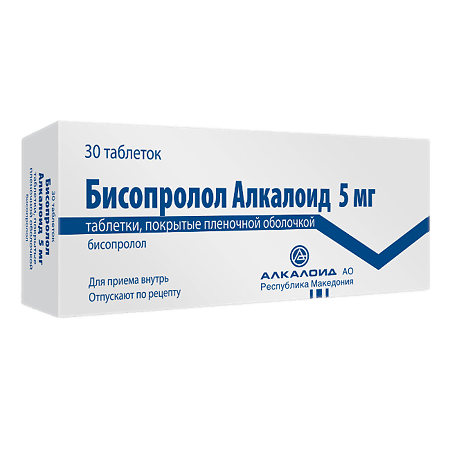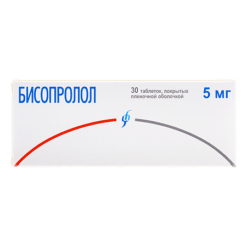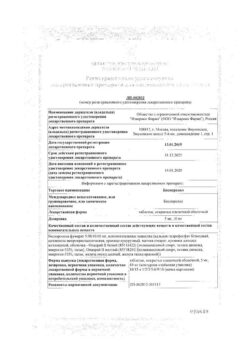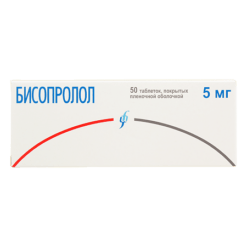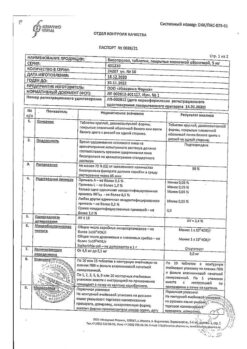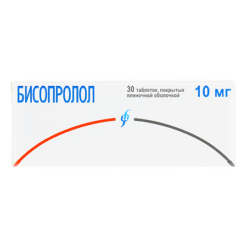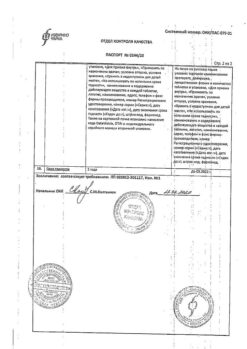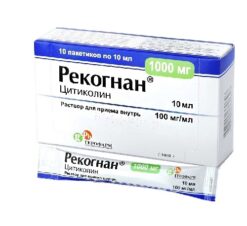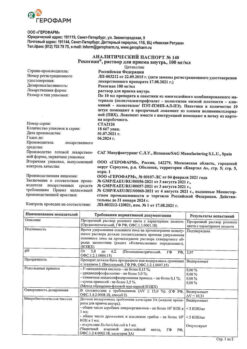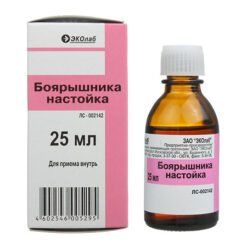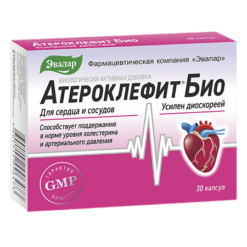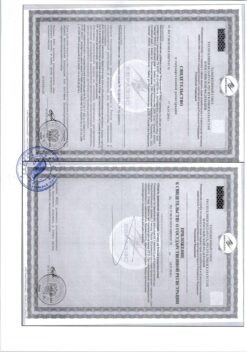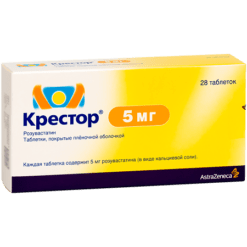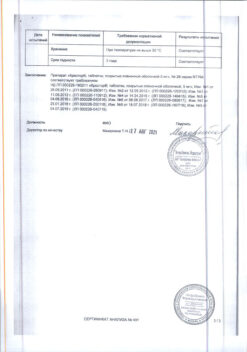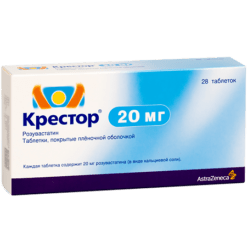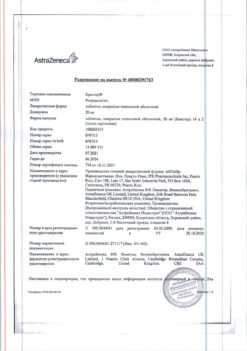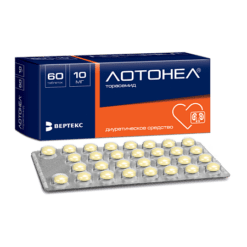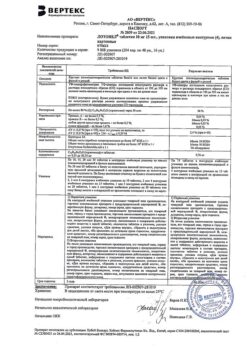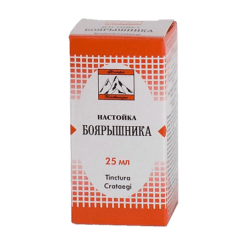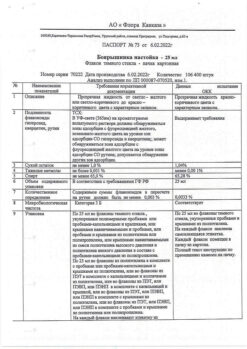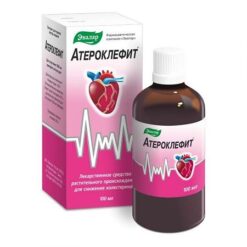No products in the cart.
Bisoprolol Alkaloid, 5 mg 30 pcs
€4.09 €3.64
Description
Pharmacotherapeutic group:
Beta1-adrenoblocker selective
ATC:
C.07.A.B Selective beta1-adrenoblockers
C.07.A.B.07 Bisoprolol
Pharmacodynamics:
Bisoprolol is a selective beta1-adrenoblocker without intrinsic sympathomimetic activity and has no membrane-stabilizing effect. Bisoprolol reduces plasma renin activity, reduces myocardial oxygen demand, and decreases heart rate (HR). It has antihypertensive, antiarrhythmic and anti-angina action.
By blocking in low doses beta1-adrenoceptors of heart, decreases catecholamine-stimulated cyclic adenosine monophosphate (cAMP) formation from adenosine triphosphate (ATP), decreases intracellular calcium ions flow, inhibits all heart functions, decreases atrioventricular (AV) conduction and excitability. If the therapeutic dose is exceeded, it has a beta2-adrenoblocking effect. Overall peripheral vascular resistance increases at the beginning of the drug administration, during the first 24 hours (as a result of reciprocal increase of activity of alpha-adrenoreceptors and elimination of stimulation of beta2-adrenoreceptors), after 1-3 days it returns to its baseline value, and during prolonged use it decreases.
Antihypertensive effect is related to the reduction of the blood minute volume, sympathetic stimulation of peripheral vessels, decrease of the sympathoadrenal system (SAS) activity (of great importance for patients with initial renin hypersecretion), restoration of sensitivity in response to blood pressure (BP) reduction and influence on the central nervous system. In arterial hypertension the effect is developed in 2-5 days, stable effect is observed after 1-2 months.
Antianginal effect is caused by decrease of myocardial oxygen demand due to decrease of contractility and other myocardial functions, prolongation of diastole, improvement of myocardial perfusion. Due to increased end diastolic pressure in the left ventricle and increased stretching of ventricular muscle fibers may increase oxygen demand, especially in patients with chronic heart failure (CHF).
When used in medium therapeutic doses, unlike non-selective beta-adrenoblockers, it has less pronounced effect on the organs containing beta2-adrenoreceptors (pancreas, skeletal muscles, smooth muscle of peripheral arteries, bronchi and uterus) and on carbohydrate metabolism; Does not cause retention of sodium ions in the body; intensity of atherogenic action does not differ from that of propranolol.
Pharmacokinetics:
Bisoprolol is almost completely (over 90%) absorbed in the gastrointestinal tract, food intake does not affect absorption. The effect of “primary passage” through the liver is insignificant (at 10-15%), resulting in high bioavailability (90%). Food intake has no effect on the bioavailability of bisoprolol.
Bisoprolol is metabolized by the oxidative pathway without subsequent conjugation. All metabolites are strongly polar and are excreted by the kidneys. The major metabolites detected in plasma and urine have no pharmacological activity. Experiments with human liver microsomes in vitro show that bisoprolol is metabolized primarily by CYP3A4 isoenzyme (about 95%), and CYP2D6 isoenzyme plays only a minor role.
Binding with blood plasma proteins is about 30%. Volume of distribution is 3.5 l/kg. Total clearance is approximately 15 l/h. Maximal concentration in blood plasma is determined after 2-3 hours. The blood plasma half-life (10-12 hours) provides efficacy for 24 hours after a single daily dose.
Bisoprololol is eliminated from the body in two ways, 50% of the dose is metabolized in the liver to form inactive metabolites. About 98% is excreted by the kidneys, of which 50% is excreted unchanged; less than 2% – through the intestine (with bile).
Since excretion takes place in the kidneys and the liver equally, patients with impaired liver function or with renal failure do not require dose adjustment. The pharmacokinetics of bisoprolol are linear and independent of age.
In patients with CHF, the plasma concentrations of bisoprolol are higher and the elimination half-life is longer compared to healthy volunteers.
There is no information on the pharmacokinetics of bisoprolol in patients with CHF and concurrent hepatic or renal impairment.
Indications
Indications
Arterial hypertension;
coronary heart disease (CHD): prevention of attacks of stable angina;
chronic heart failure (CHF).
Pharmacological effect
Pharmacological effect
Pharmacotherapeutic group:
Beta1-adrenergic blocker selective
ATX:
C.07.A.B Selective beta1-blockers
C.07.A.B.07 Bisoprolol
Pharmacodynamics:
Bisoprolol is a selective beta1-blocker, without its own sympathomimetic activity, and does not have a membrane-stabilizing effect. Bisoprolol reduces renin activity in blood plasma, reduces myocardial oxygen demand, and reduces heart rate (HR). Has antihypertensive, antiarrhythmic and antianginal effects.
By blocking beta1-adrenergic receptors of the heart in low doses, it reduces the catecholamine-stimulated formation of cyclic adenosine monophosphate (cAMP) from adenosine triphosphate (ATP), reduces the intracellular current of calcium ions, inhibits all cardiac functions, reduces atrioventricular (AV) conductivity and excitability. When the therapeutic dose is exceeded, it has a beta2-adrenergic blocking effect. Total peripheral vascular resistance at the beginning of drug use, in the first 24 hours, increases (as a result of a reciprocal increase in the activity of alpha-adrenergic receptors and elimination of stimulation of beta2-adrenergic receptors), after 1-3 days it returns to its original value, and with long-term use it decreases.
The antihypertensive effect is associated with a decrease in minute blood volume, sympathetic stimulation of peripheral vessels, a decrease in the activity of the sympathoadrenal system (SAS) (of great importance for patients with initial hypersecretion of renin), restoration of sensitivity in response to a decrease in blood pressure (BP) and an effect on the central nervous system. In case of arterial hypertension, the effect develops after 2-5 days, a stable effect is observed after 1-2 months.
The antianginal effect is due to a decrease in myocardial oxygen demand as a result of decreased contractility and other myocardial functions, prolongation of diastole, and improved myocardial perfusion. Due to increased end-diastolic pressure in the left ventricle and increased stretch of ventricular muscle fibers, oxygen demand may increase, especially in patients with chronic heart failure (CHF).
When used in average therapeutic doses, in contrast to non-selective beta-blockers, it has a less pronounced effect on organs containing beta2-adrenergic receptors (pancreas, skeletal muscles, smooth muscles of peripheral arteries, bronchi and uterus) and on carbohydrate metabolism; does not cause sodium ion retention in the body; the severity of the atherogenic effect does not differ from the effect of propranolol.
Pharmacokinetics:
Bisoprolol is almost completely (more than 90%) absorbed from the gastrointestinal tract; food intake does not affect absorption. The effect of “first pass” through the liver is insignificant (at the level of 10-15%), which leads to high bioavailability (90%). Food intake does not affect the bioavailability of bisoprolol.
Bisoprolol is metabolized via the oxidative pathway without subsequent conjugation. All metabolites have strong polarity and are excreted by the kidneys. The main metabolites found in blood plasma and urine do not exhibit pharmacological activity. Data obtained from in vitro experiments with human liver microsomes indicate that bisoprolol is metabolized primarily by the CYP3A4 isoenzyme (about 95%), with the CYP2D6 isoenzyme playing only a minor role.
Communication with blood plasma proteins is about 30%. Volume of distribution – 3.5 l/kg. Total ground clearance is approximately 15 l/h. The maximum concentration in blood plasma is determined after 2-3 hours. Permeability through the blood-brain barrier and placental barrier is low.
The plasma half-life (10-12 hours) ensures effectiveness within 24 hours of a single daily dose.
Bisoprolol is excreted from the body in two ways; 50% of the dose is metabolized in the liver with the formation of inactive metabolites. About 98% is excreted by the kidneys, of which 50% is excreted unchanged; less than 2% – through the intestines (with bile).
Since excretion occurs equally in the kidneys and liver, no dosage adjustment is required in patients with impaired liver function or renal failure. The pharmacokinetics of bisoprolol is linear and does not depend on age.
In patients with CHF, plasma concentrations of bisoprolol are higher and the half-life is longer compared to healthy volunteers.
There is no information on the pharmacokinetics of bisoprolol in patients with CHF and concurrent impairment of liver or kidney function.
Special instructions
Special instructions
Monitoring the condition of patients taking Bisoprolol should include measuring heart rate and blood pressure, performing an ECG, determining blood glucose concentrations in patients with diabetes (once every 4-5 months).
In elderly patients, it is recommended to monitor kidney function (once every 4-5 months).
The patient should be trained in the method of calculating heart rate and instructed about the need for medical consultation if the heart rate is less than 50 beats/min.
Before starting treatment, it is recommended to conduct a study of pulmonary function in patients with a complicated bronchopulmonary history.
Patients who use contact lenses should take into account that during treatment with the drug, the production of tear fluid may decrease.
When using the drug Bisoprolol in patients with pheochromocytoma, there is a risk of developing paradoxical arterial hypertension (if effective blockade of alpha-adrenergic receptors is not previously achieved).
In thyrotoxicosis, bisoprolol may mask certain clinical signs of thyrotoxicosis (for example, tachycardia). Abrupt withdrawal of the drug in patients with thyrotoxicosis is contraindicated as it can increase symptoms.
In diabetes mellitus, it can mask tachycardia caused by hypoglycemia. Unlike non-selective beta-blockers, it practically does not enhance insulin-induced hypoglycemia and does not delay the restoration of blood glucose concentrations to normal values.
When using clonidine simultaneously, its use can be discontinued only a few days after discontinuation of the drug Bisoprolol.
It is possible that the severity of the hypersensitivity reaction may increase and there will be no effect from the usual doses of epinephrine (adrenaline) against the background of a burdened allergic history.
If planned surgical treatment is necessary, the drug should be discontinued 48 hours before general anesthesia. If the patient took the drug before surgery, he should choose a drug for general anesthesia with minimal negative lyotropic effects.
Reciprocal activation of the vagus nerve can be eliminated by intravenous atropine (1-2 mg).
Drugs that deplete catecholamine stores (including reserpine) may enhance the effect of running blockers, therefore patients taking such combinations of drugs should be under constant medical supervision to detect a pronounced decrease in blood pressure or bradycardia.
Patients with bronchospastic diseases may be prescribed cardioselective beta-blockers with caution in case of intolerance and/or ineffectiveness of other antihypertensive drugs. While taking beta-blockers in patients with concomitant bronchial asthma, airway resistance may increase. If the dose of Bisoprolol is exceeded in such patients, there is a risk of developing bronchospasm.
If increasing bradycardia (heart rate less than 60 beats per minute), a pronounced decrease in blood pressure (systolic blood pressure less than 100 mm Hg), or AV blockade is detected in patients, it is necessary to reduce the dose or stop treatment.
It is recommended to discontinue therapy with Bisoprolol if depression develops.
Treatment should not be abruptly interrupted due to the risk of developing severe arrhythmias and myocardial infarction. The withdrawal of the drug is carried out gradually, reducing the dose over 2 weeks or more (reduce the dose by 25% in 3-4 days).
The drug should be discontinued before testing the concentrations of catecholamines, normetanephrine, vanillylmandelic acid, and antinuclear antibody titers in the blood and urine.
Beta blockers are less effective in smokers.
Impact on the ability to drive vehicles. Wed and fur.:
The use of the drug Bisoprolol does not affect the ability to drive vehicles according to the results of a study in patients with coronary artery disease. However, due to individual reactions, the ability to drive vehicles or operate technically complex mechanisms may be impaired. Particular attention should be paid to this at the beginning of treatment, after changing the dose, and also when consuming alcohol at the same time.
Active ingredient
Active ingredient
Bisoprolol
Composition
Composition
1 film-coated tablet contains:
active ingredient:
bisoprolol fumarate 5 mg.
excipients:
lactose monohydrate,
microcrystalline cellulose,
colloidal silicon dioxide,
crospovidone,
magnesium stearate.
Pregnancy
Pregnancy
Bisoprolol has pharmacological effects that may have harmful effects on pregnancy and/or the fetus or newborn. Typically, beta blockers reduce placental perfusion, leading to reduced fetal growth, intrauterine fetal death, miscarriage, or premature birth. The fetus and newborn may experience pathological reactions (for example, hypoglycemia, bradycardia, hypotension).
Bisoprolol should not be used during pregnancy; use is possible if the benefit to the mother outweighs the risk of side effects in the fetus and/or child.
Contraindications
Contraindications
Hypersensitivity to bisoprolol, components of the drug and other beta-blockers, acute heart failure or decompensated CHF, requiring inotropic therapy;
shock (including cardiogenic);
pulmonary edema;
atrioventricular block (AV) block II-III degree without pacemaker;
sinoatrial block;
sick sinus syndrome;
bradycardia (heart rate less than 60 beats/min);
severe arterial hypotension (systolic blood pressure (BP) 100 mmHg);
severe forms of bronchial asthma and chronic obstructive pulmonary disease (COPD) in history;
severe peripheral circulatory disorders, Raynaud’s syndrome: metabolic acidosis;
pheochromocytoma (without simultaneous use of alpha-blockers);
simultaneous use of monoamine oxidase inhibitors (MAO) (with the exception of MAO type B inhibitors);
age under 18 years (efficacy and safety have not been established);
lactose intolerance, lactase deficiency or glucose-galactose malabsorption syndrome.
With caution:
Carrying out desensitizing therapy, Prinzmetal’s angina, hyperthyroidism, type 1 diabetes mellitus and diabetes mellitus with significant fluctuations in blood glucose concentrations, AV block of the first degree, severe renal failure (creatinine clearance (CC) less than 20 ml/min), severe liver dysfunction, psoriasis, restrictive cardiomyopathy, congenital heart defects or heart valve disease with severe hemodynamic disturbances, CHF with myocardial infarction within the last 3 months, strict diet, depression (including a history), old age.
Side Effects
Side Effects
The frequency of adverse reactions listed below was determined according to the following (World Health Organization classification): very often – at least 10%; often – at least 1%, but less than 10%; infrequently – not less than 0.1%, but less than 1%; rarely – not less than 0.01%, but less than 0.1%: very rarely – less than 0.01%, including individual messages.
From the heart and blood vessels: very often – decrease in heart rate (bradycardia, especially in patients with CHF); feeling of heartbeat; often – a pronounced decrease in blood pressure (especially in patients with CHF), manifestation of vasospasm (increased peripheral circulatory disorders, a feeling of coldness in the extremities (paresthesia); infrequently – impaired AV conduction (up to the development of complete transverse block and cardiac arrest), arrhythmias, orthostatic hypotension, worsening of CHF with the development of peripheral edema (swelling of the ankles, groaning, shortness of breath), pain in the chest.
From the nervous system: often – dizziness, headache, asthenia, increased fatigue, sleep disturbances, depression, anxiety; rarely – confusion or short-term memory loss, nightmares, hallucinations, myasthenia gravis, tremors, muscle cramps. Typically, these phenomena are mild in nature and usually disappear within 1-2 weeks after the start of treatment.
From the senses: rarely – blurred vision, decreased lacrimation (should be taken into account when wearing contact lenses), tinnitus, hearing loss, ear pain; very rarely – dry and sore eyes, conjunctivitis, taste disturbances.
From the respiratory system: infrequently – bronchospasm in patients with bronchial asthma or obstructive airway diseases; rarely – allergic rhinitis, nasal congestion.
From the digestive system: often – nausea, vomiting, diarrhea, constipation, dry oral mucosa, abdominal pain; rarely – hepatitis, increased activity of liver enzymes (alanine aminotransferase, aspartate aminotransferase), increased bilirubin concentration.
From the musculoskeletal system: infrequently – arthralgia, back pain.
From the genitourinary system: very rarely – impaired potency, weakened libido.
Laboratory indicators: rarely – increased concentration of triglycerides in the blood; in some cases – thrombocytopenia, agranulocytosis, leukopenia.
Allergic reactions: rarely – itching, rash, urticaria.
From the skin: rarely – increased sweating, skin hyperemia, exanthema, psoriasis-like skin reactions; very rarely – alopecia; beta-blockers can aggravate the course of psoriasis.
Other: withdrawal syndrome (increased angina attacks, increased blood pressure).
Interaction
Interaction
Not recommended combinations
Class I antiarrhythmic drugs (for example, quinidine, disopyramide, lidocaine, phenytoin; flecainide, propafenone), when used simultaneously with bisoprolol, can reduce AV conduction and cardiac contractility.
Blockers of “slow” calcium channels (SCBC) such as verapamil and, to a lesser extent, diltiazem, when used simultaneously with bisoprolol, can lead to a decrease in myocardial contractility and impaired AV conduction. In particular, intravenous administration of verapamil to patients taking beta-blockers can lead to severe arterial hypotension and AV block.
Centrally acting antihypertensives (such as clonidine, methyldopa, moxonidine, rilmenidine) can lead to a decrease in heart rate and cardiac output, as well as vasodilation due to a decrease in central sympathetic tone. Abrupt withdrawal, especially before discontinuation of beta-blockers, may increase the risk of developing rebound hypertension.
Combinations requiring caution
Class III antiarrhythmics (eg, amiodarone) may worsen AV conduction disturbances.
The effect of topical beta-blockers (for example, eye drops for the treatment of glaucoma) may enhance the systemic effects of bisoprolol (lowering blood pressure, lowering heart rate).
Parasympathomimetics, when used simultaneously with bisoprolol, may increase AV conduction disturbances and increase the risk of developing bradycardia.
The simultaneous use of Bisoprolol with beta-agonists (for example, isoprenaline, dobutamine) may lead to a decrease in the effect of both drugs.
The combination of bisoprolol with adrenergic agonists that affect beta and alpha adrenergic receptors (for example, norepinephrine, epinephrine) may enhance the vasoconstrictor effects of these drugs that occur with the participation of alpha adrenergic receptors, leading to an increase in blood pressure. Such interactions are more likely when using non-selective beta-blockers.
Mefloquine, when used concomitantly with bisoprolol, may increase the risk of bradycardia.
Allergens used for immunotherapy or allergen extracts for skin testing increase the risk of severe systemic allergic reactions or anaphylaxis in patients receiving bisoprolol.
Iodine-containing radiopaque diagnostic agents for intravenous administration increase the risk of anaphylactic reactions.
Phenytoin, when administered intravenously, and agents for inhalation anesthesia (hydrocarbon derivatives) increase the severity of the cardiodepressive effect and the likelihood of a decrease in blood pressure.
The effectiveness of insulin and hypoglycemic agents for oral administration may change during treatment with bisoprolol (masks the symptoms of developing hypoglycemia: tachycardia, increased blood pressure).
The clearance of lidocaine and xanthines (except theophylline) may be reduced due to a possible increase in their concentration in the blood plasma, especially in patients with an initially increased clearance of theophylline under the influence of smoking.
The antihypertensive effect is weakened by nonsteroidal anti-inflammatory drugs (NSAIDs) (sodium ion retention and blockade of prostaglandin synthesis by the kidneys), glucocorticosteroids and estrogens (sodium ion retention).
Cardiac glycosides, methyldopa, reserpine and guanfacine, blockers of “slow” calcium channels (verapamil, diltiazem), amiodarone and other antiarrhythmic drugs increase the risk of developing or worsening bradycardia, AV block, cardiac arrest and heart failure.
Nifedipine can lead to a significant decrease in blood pressure.
Diuretics, clonidine, sympatholytics, hydralazine and other antihypertensive drugs can lead to an excessive decrease in blood pressure.
The effect of non-depolarizing muscle relaxants and the anticoagulant effect of coumarins may be prolonged during treatment with bisoprolol.
Tricyclic and tetracyclic antidepressants, antipsychotics (neuroleptics), ethanol, sedatives and hypnotics increase depression of the central nervous system.
Concomitant use with MAO inhibitors (except for MAO B inhibitors) is not recommended due to a significant increase in the antihypertensive effect. Concomitant use may also lead to the development of a hypertensive crisis. The break in treatment between taking MAO inhibitors and bisoprolol should be at least 14 days.
Non-hydrogenated ergot alkaloids increase the risk of developing peripheral circulatory disorders.
Ergotamine increases the risk of developing peripheral circulatory disorders.
Sulfasalazine increases the concentration of bisoprolol in the blood plasma.
Rifampin shortens the half-life of bisoprolol.
Overdose
Overdose
Symptoms: arrhythmia, ventricular extrasystole, severe bradycardia, AV block, marked decrease in blood pressure, acute heart failure, hypoglycemia, acrocyanosis, difficulty breathing, bronchospasm, dizziness, fainting, convulsions.
Treatment: if an overdose occurs, first of all, you must stop taking the drug, perform gastric lavage, prescribe adsorbents, and carry out symptomatic therapy.
For severe bradycardia, intravenous administration of atropine. If the effect is insufficient, a drug with a positive chronotropic effect can be administered with caution. Sometimes temporary placement of an artificial pacemaker may be necessary.
With a pronounced decrease in blood pressure, intravenous administration of plasma-substituting solutions and vasopressors.
For hypoglycemia, intravenous dextrose (glucose) may be indicated.
For AV block: Patients should be closely monitored and treated with beta-agonists such as epinephrine. If necessary, install an artificial pacemaker.
In case of exacerbation of CHF, intravenous administration of diuretics, drugs with a positive inotropic effect, as well as vasodilators.
For bronchospasm, prescribe bronchodilators, including beta2-adrenergic agonists and/or aminophylline.
Storage conditions
Storage conditions
Store in a dry place, protected from light, at a temperature not exceeding 25 °C.
Keep out of the reach of children.
Shelf life
Shelf life
2 years.
Manufacturer
Manufacturer
Alkaloid AD Skopje, Republic of North Macedonia
Additional information
| Shelf life | 2 years. |
|---|---|
| Conditions of storage | Store in a dry, dark place at temperatures under 25 ° C. Keep out of reach of children. |
| Manufacturer | Alkaloid AD Skopje, Republic of Northern Macedonia |
| Medication form | pills |
| Brand | Alkaloid AD Skopje |
Other forms…
Related products
Buy Bisoprolol Alkaloid, 5 mg 30 pcs with delivery to USA, UK, Europe and over 120 other countries.

